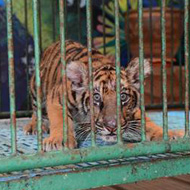
True scale of worrying tiger tourism trend documented
World Animal Protection has released a report detailing the abuse of captive tigers in Thailand.
Tiger selfies exposed: a portrait of Thailand’s tiger entertainment industry has been published ahead of International Tiger Day on Friday 29 July, and follows the recent closure of Thailand’s Tiger Temple.
As part of a wider 'Wildlife - Not Entertainers' campaign, the report not only evidences a 33 per cent increase in numbers of captive tigers in five years, but also outlines several welfare concerns related to the increasingly popular tiger entertainment industry.
The report cites early mother and cub separation, repeated stressful mishandling of cubs, restrictive and inappropriate enclosures and limited water access as significant welfare issues. Investigations uncovered a concerning number of animals demonstrating behavioural stress indicators including pacing and tail biting.
The report also details an increase in cruel techniques to make the animals submissive enough to tolerate close encounters with humans. Visiting 17 popular tiger entertainment venues, Sriracha Tiger Zoo in Pattaya held the most tigers and the poorest conditions.
Julie Middelkoop, head of the campaign, said: "We’re asking tourists to think about the welfare of the tigers, and we’re calling on the travel industry to stop promoting and profiting from tiger cruelty. If you can get up close, hug or have a selfie with a tiger it's cruel and don't go."
World Animal Protection is urging travellers to avoid wildlife tourist entertainment venues that promote direct human-animal interaction. It is also calling for travel companies to stop promoting the attractions, and governments worldwide to close down tiger entertainment venues where neglect and cruelty occurs.
Image courtesy of World Animal Protection



 The BSAVA has opened submissions for the BSAVA Clinical Research Abstracts 2026.
The BSAVA has opened submissions for the BSAVA Clinical Research Abstracts 2026.